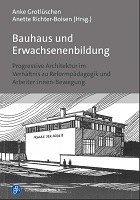Bauhaus und Erwachsenenbildung
Progressive Architektur im Verhältnis zu Reformpädagogik und Arbeiter:innen-Bewegung
| dc.contributor.editor | Grotlüschen, Anke | |
| dc.contributor.editor | Richter-Boisen, Anette | |
| dc.date.accessioned | 2023-10-30T13:53:28Z | |
| dc.date.available | 2023-10-30T13:53:28Z | |
| dc.date.issued | 2023 | |
| dc.identifier.uri | https://library.oapen.org/handle/20.500.12657/77045 | |
| dc.description.abstract | What role do the philosophy and pedagogical concepts of the Bauhaus play for adult education? And to what extent were progressive approaches to adult education able to influence Bauhaus architecture? The authors outline connections between the Bauhaus idea of form follows function and the history of institutionalised adult education, which reveal a surprising number of points of contact. | en_US |
| dc.language | German | en_US |
| dc.subject.classification | bic Book Industry Communication::J Society & social sciences::JN Education::JNP Adult education, continuous learning | en_US |
| dc.subject.other | Bauhaus education;Bauhauspädagogik;architecture;Architektur;design;reform education;Reformpädagogik;community college;Volkshochschule;Bildung;education;Hannes Meyer;Gertrud Hermes;Wilhelm Flitner;Elisabeth Flitner | en_US |
| dc.title | Bauhaus und Erwachsenenbildung | en_US |
| dc.title.alternative | Progressive Architektur im Verhältnis zu Reformpädagogik und Arbeiter:innen-Bewegung | en_US |
| dc.type | book | |
| oapen.abstract.otherlanguage | Welche Rolle spielen die Philosophie und die pädagogischen Konzepte des Bauhauses für die Erwachsenenbildung? Und inwiefern konnten progressive Ansätze der Erwachsenenbildung die Bauhausarchitektur beeinflussen? Die Autor*innen skizzieren Verbindungen zwischen der Bauhaus-Idee form follows function und der Geschichte der institutionalisierten Erwachsenenbildung, die überraschend viele Berührungspunkte zum Vorschein kommen lassen. | en_US |
| oapen.identifier.doi | 10.3224/84742762 | en_US |
| oapen.relation.isPublishedBy | c71f4dcb-6466-4fde-8a25-0516cdd477b8 | en_US |
| oapen.relation.isbn | 9783847427629 | en_US |
| oapen.pages | 198 | en_US |

